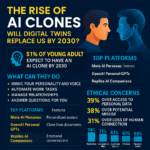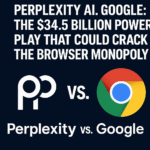Now Reading: Perplexity vs. Google — The $34.5 Billion Power Play That Could Crack the Browser Monopoly
-
01
Perplexity vs. Google — The $34.5 Billion Power Play That Could Crack the Browser Monopoly
Perplexity vs. Google — The $34.5 Billion Power Play That Could Crack the Browser Monopoly

Perplexity vs. Google — The $34.5 Billion Power Play That Could Crack the Browser Monopoly
The $34.5 Billion Bombshell in a Google-Dominated Market
On August 12, 2025, US-based startup Perplexity AI, officially valued at $5.2 billion after its June funding round, dropped a shockwave through Silicon Valley: a $34.5 billion cash offer to acquire Google Chrome.
Chrome holds a 65.86% global market share (StatCounter, July 2025) — that’s over 3.4 billion monthly active users. More than a browser, Chrome is responsible for roughly 28% of Google’s annual advertising revenue (eMarketer estimate), as it funnels traffic into Google Search — the company’s golden goose.
Perplexity’s pitch is simple yet radical: fully open-source Chrome’s code, publish it under a free license, but keep Google as the default search engine for “economic stability.”
The Numbers Behind the Power Grab
When you put $34.5 billion on the table, here’s what you’re really buying:
- Billions of digital profiles — complete browsing histories, interests, login data, and behavioral patterns.
- A global infrastructure processing over 1.2 trillion HTTP requests daily.
- An extension & app ecosystem powering the entire SaaS industry.
For perspective: Microsoft bought LinkedIn in 2016 for $26.2B, Elon Musk took Twitter (X) in 2022 for $44B. The difference? Chrome isn’t a social platform — it’s the main gateway to the internet.
The Antitrust Gamble in a Trump-Era Landscape
The timing is explosive: under President Trump, the US Department of Justice has intensified antitrust action against Big Tech. In May 2025, Google was fined $2.9 billion in the EU for “anti-competitive practices” by forcing Google Search integration into Chrome.
Perplexity is playing right into this fault line:
- Public argument: “We’re breaking the monopoly and opening the tech.”
- Strategic reality: Keeping Google as the default preserves revenue flows and could appease Alphabet shareholders.
It’s crafted to look innovative enough for regulators to approve while still being “friendly” enough not to destroy Chrome’s market value.
Potential Market Shockwaves
If approved, this would be the largest single-product software acquisition in history, 32% bigger than Salesforce’s $27.7B purchase of Slack.
The ripple effects could include:
- Microsoft Edge — losing ground rapidly with just an 11.2% share.
- Apple Safari — safe within iOS but exposed to antitrust pressure if open-source becomes the new standard.
- Mozilla Firefox — potentially revitalized through integration with Chrome’s open-source infrastructure.
Even a 5% user migration from Chrome equals 170 million people — a potential disaster for Google Ads revenue.
The Real Battle: AI + Browser = Digital Reality Control
Why would Perplexity throw $34.5B at Chrome? Not for a “better browser” — but for distribution dominance.
Perplexity is already an AI-first search engine, capable of conversational, contextual responses. What it lacks is massive delivery infrastructure.
Owning Chrome means Perplexity could:
- Integrate AI natively into browsing for billions of users.
- Bypass Google Search in countless scenarios, eroding Google’s core business.
- Collect behavioral data directly for training AI models — without Google’s filter.
This is exactly why Google could see the deal as an existential threat — in the wrong hands, Chrome becomes a weapon against its own revenue engine.
Revolution or a Strategic Bluff?
Financial analysts question the funding source: Perplexity simply doesn’t have that much cash. Two scenarios emerge:
- A covert backer — possibly Microsoft or Amazon — using Perplexity as a proxy to avoid direct scrutiny.
- A high-stakes bluff — designed to push Google into concessions or exclusive tech partnerships.
Either way, one fact stands: $34.5 billion here isn’t just buying software — it’s buying the future control of the internet’s front door.




























